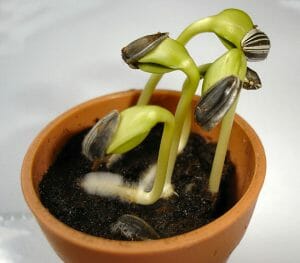Germination Definition
Germination refers to the process by which an organism grows from a seed or a spore. The most common forms of germination include a seed sprouting to form a seedling and the formation of a sporeling from a spore. Thus, germination occurs primarily in plant and fungal species.
Germination Process
The process of germination is as follows:
- Environmental conditions are favorable: For germination to occur, the environmental conditions must be favorable in order to support the growing plant. The soil depth, amount of water, and temperature are all critical conditions that must be met in order for the process of germination to be initiated. Typically, the soil conditions must be moist and warm.
- Water imbibition: When environmental conditions are optimal, germination is initiated by a process termed water imbibition. The seed absorbs water through a structure called a micropyle, which induces swelling of the seed until it splits open.
- Root and Shoot formation: Once the seed has ruptured, the radicle (primary root) and plumule (shoot) can emerge from the seed. This process is initiated by specific enzymes that become activated when the seed is exposed to water. The roots grow downwards, and the shoot grows upwards towards the soil surface.
- A seedling is formed: Once the shoot emerges from the soil surface, the cotyledons become fully unfolded and expand, eventually forming the first leaves. Once this occurs, the plant is ready to initiate photosynthesis and is considered a seedling (shown below).
Germination Temperature
Among other conditions, the temperature is critical for germination to occur. Although the temperature will affect the plant’s growth rate and metabolism, most plants will germinate over a wide temperature range (e.g., 16 to 24 degrees Celsius). Depending on the specific climate, some plants will only germinate when conditions are cool, while others require warm temperatures. Moreover, there are several plant species that require temperatures to fluctuate between cold and warm in order to break dormancy and facilitate germination. For example, some seeds require exposure to cold winter temperatures (e.g., 4 to -5 degrees Celsius) prior to germination, while other require extreme heat (e.g., forest fires) to crack the seed in order to initiate germination. It is thought that it is a mechanism by which optimal growth conditions can be anticipated. For example, some seeds absorb water during the fall, which causes the seed to erupt during the cold winter temperatures. Once the soil warms again, the sprout and roots will emerge, forming a seedling just as the amount of water and sunlight increase during the spring and summer months.
Quiz
1. Which of the following is NOT a condition required for germination?
A. Temperature
B. Water
C. Sunlight
D. All of the above
2. Which of the following statements is TRUE regarding water imbibition?
A. Water imbibition is not required for germination.
B. Water imbibition is required for the seed to rupture.
C. Water imbibition refers to the expulsion of water from the seed.
D. None of the above responses are true.
References
- Bushart, T and Roux, S. (2007). Conserved Features of Germination and Polarized Cell Growth: A Few Insights from a Pollen–Fern Spore Comparison. Annals of Botany. 99(1):9–17.
- Finch-Savage, WE and Footitt, S. (2017). Seed dormancy cycling and the regulation of dormancy mechanisms to time germination in variable field environments. J Exp Bot. 68(4):843-856.
- Penfield, S andn MacGregor, DR. (2017). Effects of environmental variation during seed production on seed dormancy and germination. J Exp Bot. 68(4):819-825.

